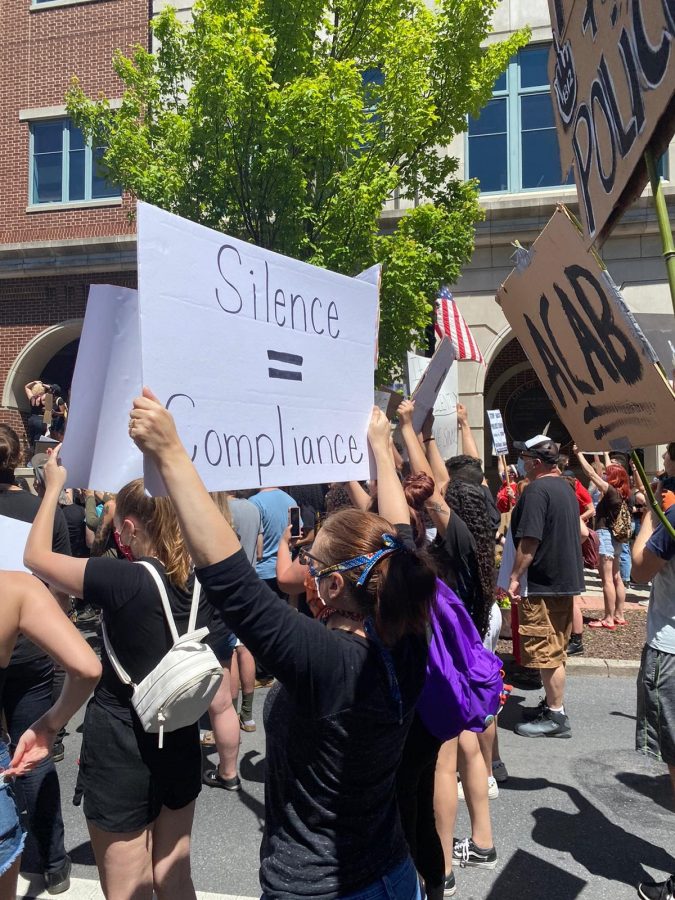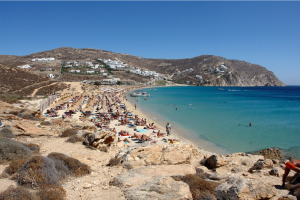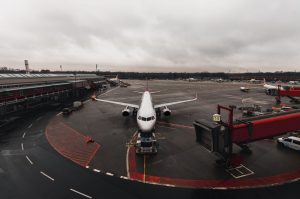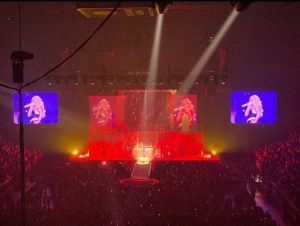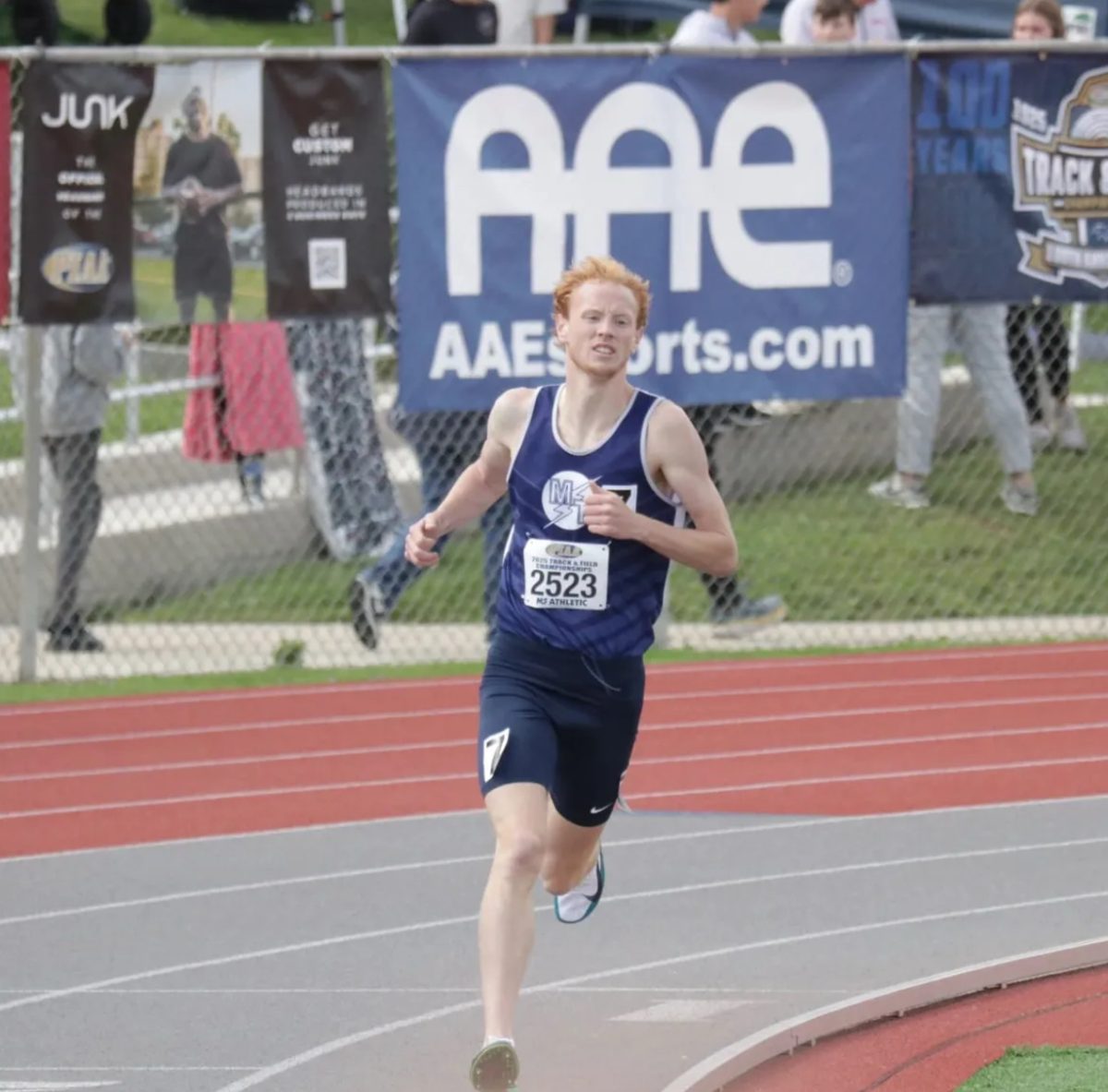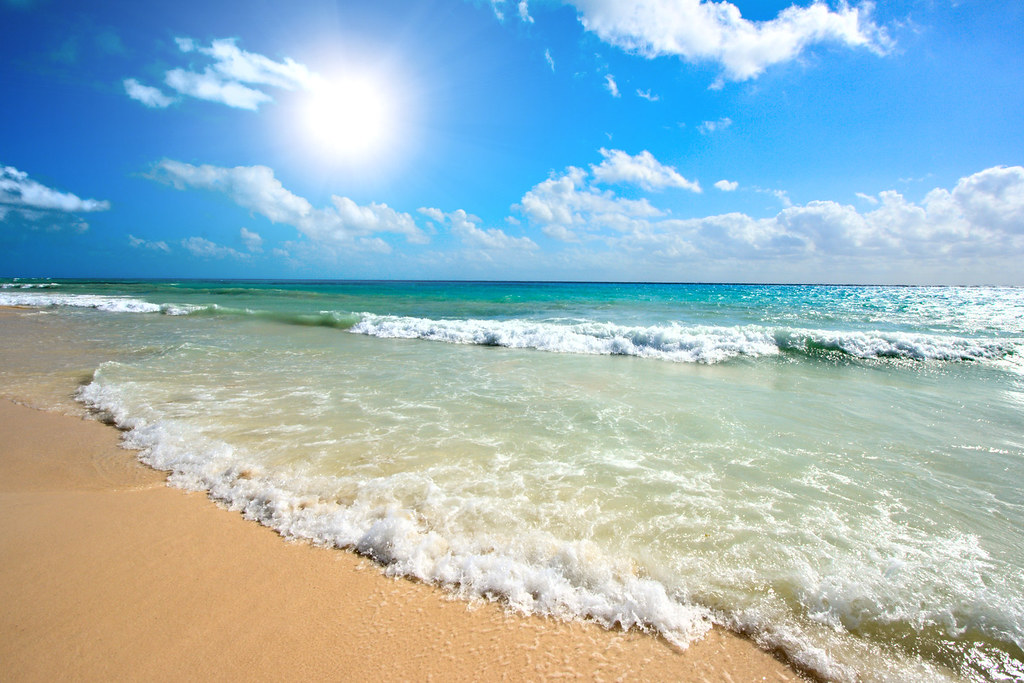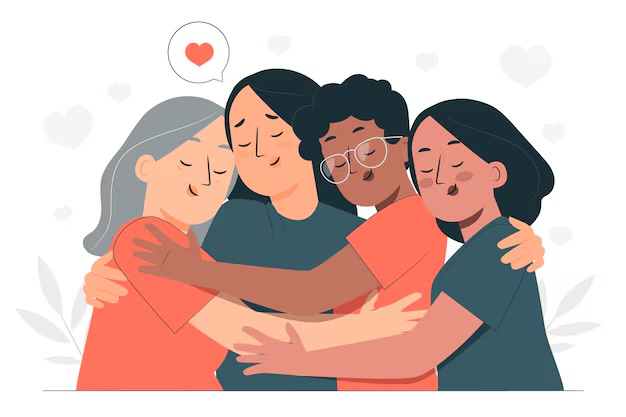MTHS students and alumni rally in solidarity with George Floyd
June 23, 2020
Nationwide rallies for systematic racial reform have erupted in large and small cities alike — including the city of Lancaster.
Despite its quiet roots, Lancaster city has been a hotspot for the Black Lives Matter (BLM) movement, attracting thousands of protestors since May 31, the Saturday after George Floyd’s killing at the hands of police officer Derek Chauvin.
In Manheim Township High School itself, the Black Student Union (BSU) club is planning to hold a Zoom call with its members in response to the recent events. The call will essentially focus on the recent deaths of George Floyd, Breonna Taylor, and Ahmaud Arbery, as well as police brutality and racial profiling in the United States. It will also focus on the current mental state of many of the club’s Black members.
“The mental health of Black students can really be impacted by this, so the Zoom call is not only to discuss social injustice, but also to touch base with each other on how we are doing,” said Gellila Asmamaw, co-creator and president of the club.
BSU is also planning to hold an all-Black panel in the upcoming school year. Asmamaw believes that in a predominantly white school, it is important for Black students to visualize themselves in high positions of excellence. She thinks that the protests have reinforced the significance and primary goal of the club, which is to recognize Black students in the school: “As the club likes to say, there is strength in diversity, and the collectiveness, cohesiveness, and unity of the global BLM protests reiterates this idea.”
Among those protesting is Manheim Township senior Trinity Tull, an advocate for the growing movement. Since that Saturday, she has continued to protest alongside others who hold many of the same frustrations regarding the treatment of Black people in the United States.
While Tull feels disappointed yet again by another police brutality case, she also believes that Floyd’s death has been especially significant due to the immense impact that it has had on American society.
“This isn’t the first time this has happened, and I don’t think it will be the last time…Right now, I’m just so upset. I wake up feeling so drained and so heavy. People are really sad right now,” said Tull.
In solidarity with Floyd, protestors have kneeled for nine minutes of silence — nearly the amount of time that the Minnesota police officer kneeled on Floyd’s neck. Along with marching through the city and standing by the police station or center square carrying signs for passers to see, protestors have also gone to the Lancaster County Prison where they can hear inmates trying to speak to those outside of the prison.
“We’ve been talking to them saying, ‘We hear you. We know this system is unjust.’ That’s a really powerful thing we’ve been doing,” said Tull.
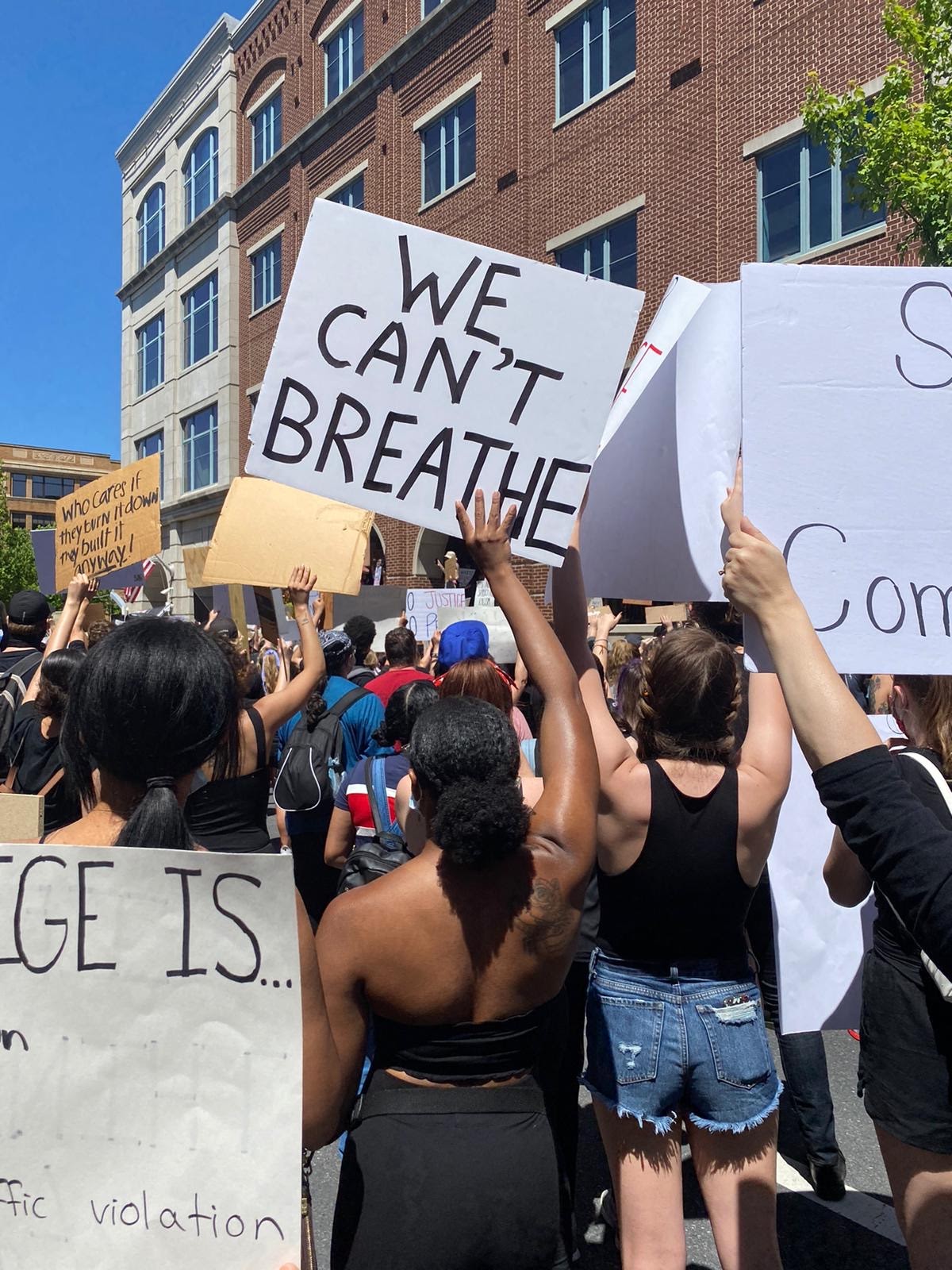
A protest in downtown Lancaster. Photo courtesy of Vivian Ealy
For those who do not protest on the ground itself, some have driven through the streets of the city, beeping and honking in support of the movement. On the second day of the protest, a car parade took place in which demonstrators held signs out of their car windows and drove through a designated pathway. The car parade allowed those concerned with the coronavirus to protest while still keeping their distance.
Despite the absence of social distancing due to the heavily concentrated protests, some precautions are still being observed. Protestors wear masks and carry hand sanitizer in an effort to reduce the spread of the virus.
“I think it’s kind of two large battles right now, and it’s hard to put one above the other. I do what I can to stay safe and to keep others safe,” Tull said.
Tull believes that the virus has given more people the opportunity to educate themselves due to having more time on their hands with the closing of schools and such. This in turn has increased support for the movement immensely, as shown by the influx of protestors the past few weeks.
Lancaster officials have also shown support for the movement. City Council members have joined the protest, as has Mayor Danene Sorace and Chief of Police Jarrad Berkihiser, who both spoke in solidarity with the protestors. Some police officers have marched as well.
“That’s really what we were waiting for. We were waiting for that response before we demanded anything. … Until the people in power recognize what we’re doing, we can’t ask for anything. Now that the mayor has spoken [and shown support], we’re setting up meetings with her and City Council to make sure the community’s voices are being heard,” Tull said.
Tull has been working with Manheim Township graduate Alaak Deu, who has been at the forefront of the march and responsible for reaching out to City Council and the mayor. So far, Deu and his team have met with the mayor three times. These meetings involve the discussion of the demands that the community has regarding racial inequality.
The demands include the implementation of city-wide anti-racism and anti-bias training for every employee, the requiring of reports to City Council of all disciplinary actions among police, and more.
For Deu, protesting for these demands has been emotional. He has led these protests multiple times, including the first and second days of the city’s protests.
“It wasn’t really my intention to be at the forefront of everything, but in the moment God told me that I got to get in front, and that’s what I did. I got in front and I started chanting. A lot of emotions hit. … If you’re not Black, then it’s just different. You can’t really relate or see everything that’s happening, but just because you can’t see it, doesn’t mean you don’t understand it,” said Deu.
In 2016, Deu began educating himself on his own culture and the Black Lives Matter movement as he was unable to learn it in school due to the lack of Black history in the curriculum. Around the same time, football quarterback Colin Kaepernick had sparked controversy when he took a knee during the playing of the national anthem.
“At the time, I felt like I was the only one that knew why he was taking a stand. … I just felt like I was obligated [to protest] because I already educated myself and I’ve been in the real world already and suffered from the blatant racism from my workplace and a little bit in school too.”
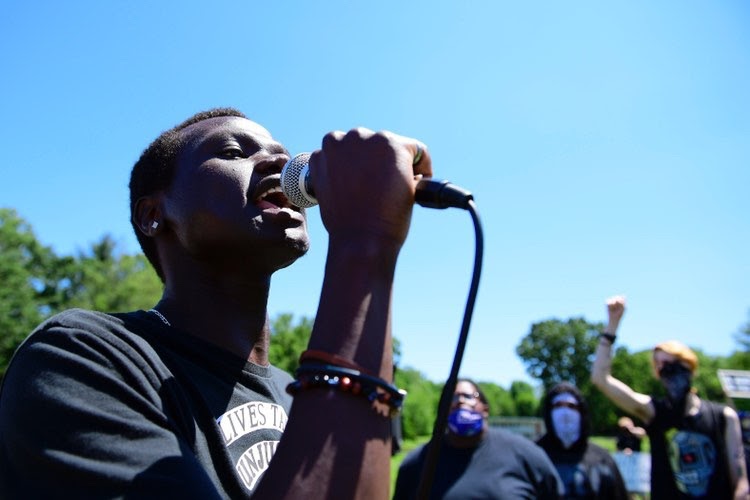
Alaak Deu at one of the protests. Photo courtesy of Patrick Blain
While these protests were predominantly influenced by the issue of police brutality, both Deu and Tull believe that solving systematic racism goes beyond solely addressing law enforcement itself. Deu thinks that it should be defunded, and if it is not, then funding should be reallocated towards improved schooling for police officers. Smaller aspects of racial inequality to be addressed include the establishment of facilities for the homeless and children, as well as a regular bus routine with simple transportation.
“It’s little things like that which really bring the Black community down because we’re put in a bad situation, and then you’re told to make something out of yourself and you can’t do that – especially when you’re Black and you’re targeted because of your skin color. … The kids need their future. They need to live a better life than I did,” said Deu. “I believed at a certain point that I was gonna be a statistic. I didn’t believe I was going to make it to my 21st birthday. I thought I was going to be another kid out there on a t-shirt that the community cries for.”
Both Tull and Deu remarked on the need for education reform due to the lack of Black history taught in schools. To fix this issue, Tull believes that hiring more diverse educators and requiring a more diverse curriculum to be taught should be implemented.
“For systematic and institutionalized racism as a whole, it starts with education. When I go to school, there are no Black teachers at Manheim Township High School or teachers of color unless it’s a language teacher. ’People fear what they don’t know.’ If we don’t teach people things from when they’re an impressionable youth, then they grow up afraid of POC simply because they’re not taught any different. We can’t expect people to educate themselves if they don’t care, so we need to make sure we’re teaching that in school and modern history,” said Tull.
While the protests have gained significant traction, the loss of momentum is a fear that has been replicated all too often in the past. Lancaster city protests may have begun with thousands of demonstrators at the city’s doors, but numbers have decreased as the protests have progressed. Tull has expressed her concern over this issue: “I’m continuing to blast my social media accounts about participating in the protests because losing traction is the scariest thing for me to think about. The Black Lives Matter movement is a solid line; it’s unwavering support, but it’s the support from the community that changes. If the momentum keeps going at this rate, I think there’s a lot of change that could happen.”
Deu and his team are continuing to build momentum and educating others by visiting other places like Elizabethtown. They plan to launch a branch of the BLM movement in Lancaster by establishing a website and social media. This will allow them to connect easily with others, as well as provide a space for people to voice their opinions. Physical and virtual places to donate towards the movement will be included as well. They also aim to meet with more government officials; not only have they met with the Lancaster city government, but they have also met with Senator Bob Casey Jr. and plan to meet with him again in August.
“We’re serious about this. We want change and we want a better future. … There’s no difference between us. If you cut me open, I’m gonna bleed the same way as anybody else,” said Deu.
To support the movement, Tull states that the primary action someone can take is to speak out on issues and educate oneself and others. She also suggests reaching out to Black friends and checking on their mental health, as there are many who are scared and upset right now. Protesting and sharing places to donate on social media are other actions one could take as well.
“Simply being an ally is so important. Understanding the struggle and not trying to tell Black people how to feel,” said Tull. “It’s been so powerful and emotional being in the streets recently and being at the protests. I’ve always known this was an issue, but until you’re really there in the moment and trying to convince people that your life matters just as much as anyone else’s, you don’t really realize how messed up the system is. … I want to see bills being passed. I want to see members of the community being able to interact with the government, and I want voices to actually be heard because I don’t want this to be brushed off like it has been so many times before. We want to see promises being kept. We just want people to fight for us and to fight for our lives. That’s the end goal.”
Deu states that some additional ways to show support is by asking questions and in turn educating oneself, voting in elections, and stepping in and de-escalating a situation when necessary.
“I will continue to fight until my last breath even though now I’m a greater target than ever. Until change actually happens … I will forever fight for the next generation because they don’t deserve to live how we’ve been living. … At the end of the day, we are people,” said Deu.


